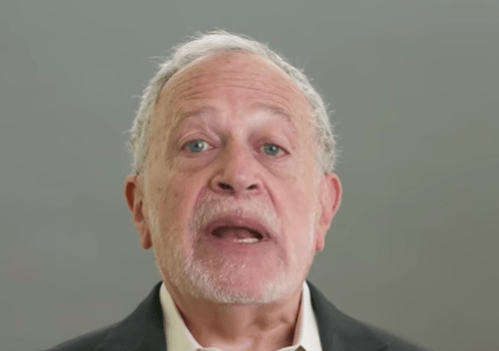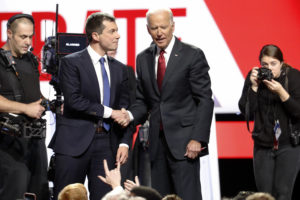Robert Reich: Corporate Social Responsibility Is a Scam
If companies like General Motors and AT&T cared about the public, they would empower workers and back laws that raise their own taxes. Former Secretary of Labor Robert Reich. (YouTube screenshot)
Former Secretary of Labor Robert Reich. (YouTube screenshot)
Boeing recently fired CEO Dennis Muilenburg in order “to restore confidence in the Company moving forward as it works to repair relationships with regulators, customers, and all other stakeholders.”
Restore confidence? Muilenburg’s successor will be David Calhoun who, as a long-standing member of Boeing’s board of directors, allowed Muilenburg to remain CEO for more than a year after the first 737 Max crash and after internal studies found that the jetliner posed an unacceptable risk of accident. It caused the deaths of 346 people.
Muilenburg raked in $30 million in 2018. He could walk away from Boeing with another $60 million.
Last August, the Business Roundtable – an association of CEOs of America’s biggest corporations, of which Muilenburg is a director – announced with great fanfare a “fundamental commitment to all of our stakeholders” (emphasis in the original) and not just their shareholders.
Rubbish. Corporate social responsibility is a sham.
Another Business Roundtable director is Mary Barra, CEO of General Motors. Just weeks after making the Roundtable commitment, and despite GM’s hefty profits and large tax breaks, Barra rejected workers’ demands that GM raise their wages and stop outsourcing their jobs. Earlier in the year GM shut its giant assembly plant in Lordstown, Ohio.
Some 50,000 GM workers then staged the longest auto strike in 50 years. They won a few wage gains but didn’t save any jobs. Meanwhile, GM’s stock has performed so well that Barra earned $22 million last year.
Another prominent Business Roundtable CEO who made the commitment to all his stakeholders is AT&T’s Randall Stephenson, who promised to invest in the company’s broadband network and create at least 7,000 new jobs with the billions the company received from the Trump tax cut.
Instead, AT&T has cut more than 30,000 jobs since the tax cut went into effect.
Let’s not forget Jeff Bezos, CEO of Amazon and its Whole Foods subsidiary. Just weeks after Bezos made the Business Roundtable commitment to all his stakeholders, Whole Foods announced it would be cutting medical benefits for its entire part-time workforce.
The annual saving to Amazon from this cost-cutting move is roughly what Bezos – whose net worth is $110 billion – makes in two hours. (Bezos’s nearly-completed D.C. mansion will have 2 elevators, 25 bathrooms, 11 bedrooms, and a movie theater.)
GE’s CEO Larry Culp is also a member of the Business Roundtable. Two months after he made the commitment to all his stakeholders, General Electric froze the pensions of 20,000 workers in order to cut costs. Culp raked in $15 million last year.
The list goes on. Just in time for the holidays, US Steel announced 1,545 layoffs at two plants in Michigan. Last year, five US Steel executives received an average compensation package of $4.8 million, a 53 percent increase over 2017.
Instead of a holiday bonus this year, Walmart offered its employees a 15 percent store discount. Oh, and did I say? Walmart saved $2.2 billion this year from the Trump tax cut.
The giant tax cut itself was a product of the Business Roundtable’s extensive lobbying, lubricated by its generous campaign donations. Several of its member corporations, including Amazon and General Motors, wound up paying no federal income taxes at all last year.
Not incidentally, the tax cut will result in less federal money for services on which Americans and their communities rely.
The truth is, American corporations are sacrificing workers and communities as never before, in order to further boost record profits and unprecedented CEO pay.
Americans know this. In the most recent Pew survey, a record 73 percent of U.S. adults (including 62 percent of Republicans and 71 percent of Republicans earning less than $30,000 a year) believe major corporations have too much power. And 65 percent believe they make too much profit.
The only way to make corporations socially responsible is through laws requiring them to be – for example, giving workers a bigger voice in corporate decision making, making corporations pay severance to communities they abandon, raising corporate taxes, busting up monopolies, and preventing dangerous products (including faulty airplanes) from ever reaching the light of day.
If the Business Roundtable and other corporations were truly socially responsible, they’d support such laws. Don’t hold your breath.
The only way to get such laws enacted is by reducing corporate power and getting big money out of politics.
The first step is to see corporate social responsibility for the con it is.
Your support is crucial…With an uncertain future and a new administration casting doubt on press freedoms, the danger is clear: The truth is at risk.
Now is the time to give. Your tax-deductible support allows us to dig deeper, delivering fearless investigative reporting and analysis that exposes what’s really happening — without compromise.
Stand with our courageous journalists. Donate today to protect a free press, uphold democracy and unearth untold stories.






You need to be a supporter to comment.
There are currently no responses to this article.
Be the first to respond.